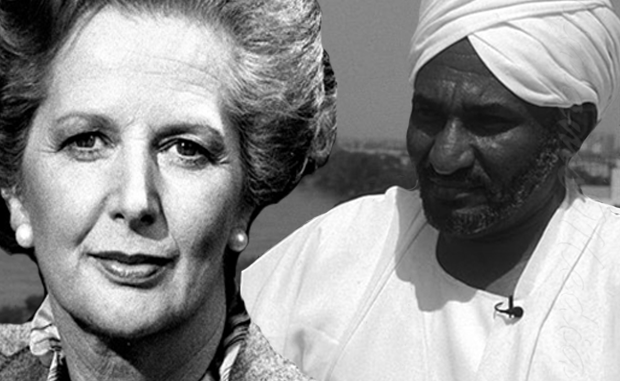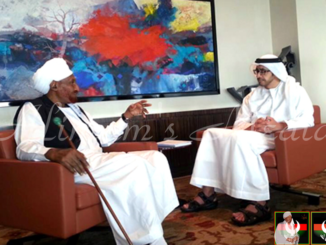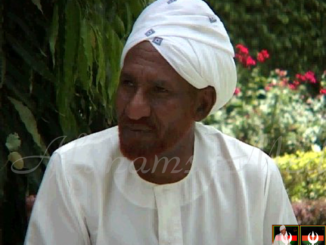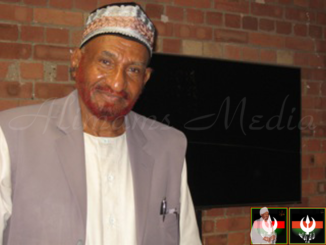
1986 Oct 15
Margaret Thatcher
Speech at lunch for Sudanese Prime Minister (Sadiq el Mahdi)
Venue: No.10 Downing Street
Source: Thatcher Archive: speaking text
(Sadiq el Mahdi) Prime Minister, Ministers, Your Excellency, My Lords, Ladies and Gentlemen.
First of all, let me extend to you, Mr. Prime Minister, and to your delegation a very warm welcome to our country.
We are delighted to have you here and we hope you will enjoy your visit.
When you were elected in the spring, one of our newspapers carried a dramatic headline.
It read: “Return of the Mahdi” .
Well, that would have made my distinguished predecessor Mr. Gladstone tremble!
But of course it did not worry us at all because you are an old friend of this country and have lived among us.
Your family, Sir, have played a unique role in Sudan’s history.
Indeed it is no exaggeration to say that the name El Mahdi is synonymous with that of Sudan and its independence.
I re-read the other day Winston Churchill ‘s fascinating account of the River War written in 1899.
In it he records vividly the moment of history in which our two countries came most dramatically into contact, in the persons of your great-grandfather the Mahdi and General Gordon.
I find the passage particularly telling, because it underlies how both sought the best for Sudan.
This is what Winston Churchill wrote:
“The names of two men of character and fame are for ever connected with the actual outburst.
One was an English general, the other an Arab priest; yet, in spite of the great gulf and vivid contrast between their conditions, they resembled each other in many respects.
Both were earnest and enthusiastic men of keen sympathies and passionate emotions. Both were powerfully swayed by religious fervour.
Both exerted great personal influence on all who came in contact with them.
Both were reformers.
In the end they fought to the death, but for an important part of their lives their influence on the fortunes of the Soudan was exerted in the same direction.”
And I would add this: it was thirty-four years ago almost to the day that your grandfather, the great Abdul Rahman El Mahdi, patron of Sudan’s independence, met Sir Winston Churchill in this building.
Prime Minister, your visit comes in the thirtieth anniversary year of Sudan’s independence, following fifty-seven years of Anglo-Egyptian joint administration.
It is not fashionable to dwell on such periods.
But I would say this.
It left in Britain a warm affection for Sudan which is as strong today as ever.
It also led to the brief but glorious existence of that remarkable institution the Sudan Political Service, one at least of whose former members is with us today.
Their total number in the whole life-span of the service was only 400, and there were never more than 150 at any one time, for a vast country of nearly one million square miles.
They were, in the words of Lord Cromer who called them into being, “active young men endowed with good health, high character and fair abilities” .
They put up with some considerable hardships including, I am told, struggling to learn Arabic from a dour volume entitled Thatcher’s Arabic Grammar.
They loved the Sudan and worked tirelessly to help make your country a viable and united modern state.
Prime Minister, your return to office earlier this year marked Sudan’s return to democracy.
That is an achievement of which the Sudanese people can justly be proud.
It is an example to Africa and more widely that even in adversity, democracy can win through.
But the return to democracy is the beginning not the end of the road.
We know that Sudan faces formidable difficulties in its struggle to achieve peace and economic reconstruction, to end the human suffering from war and drought, suffering which has been brought vividly into the homes of everyone in this country by heart-rending pictures on our television screens.
I know of the outstanding work which has been done by the voluntary agencies—many of whose representatives are at this lunch—to help you overcome these difficulties.
We all remember, too, when that magnificent athlete from the Sudan, Omar Khalifa, ran through London last May to help raise funds for Sport Aid.
I am proud to say that the British people have responded magnificently to appeals to help, by giving to Bandaid, to Sportaid, to the voluntary agencies and, as taxpayers, through the British government.
Prime Minister, I know that all of us in this room are confident of your courage and your determination to overcome the problems which Sudan faces.
I pledge to you the support and goodwill of the British Government and people as you confront this challenge.
And I ask everyone here to rise and join me in drinking a toast to the Republic of Sudan, to Prime Minister Sadiq el Mahdi and to the success of his efforts to bring peace and prosperity to the people of Sudan.
Source: Thatcher Archive




